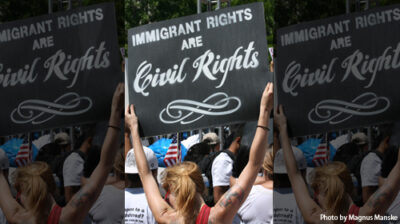
Lowcountry Immigration Coalition, et al. v. Nikki Haley
What's at Stake
In 2011 South Carolina passed SB 20, a law modeled after Arizona’s notorious SB 1070. The law required police to demand "papers" demonstrating citizenship or immigration status during traffic stops based on "reasonable suspicion" that a person lacks legal status. It also criminalized South Carolinians for everyday interactions with undocumented individuals, such as driving someone to church, or renting a room to a friend.
Summary
On October 11, 2011 the ACLU Immigrant Rights Project, along with a coalition of civil rights groups, filed suit against SB 20, charging it was unconstitutional, invited racial profiling, and would interfere with the federal government’s sole authority in immigration matters.
On December 22, 2011, the district court issued a decision preliminarily blocking key sections of the law. After the Supreme Court decision in Arizona v. United States, oral argument was again held before the district court as to the impact of that decision and on November 15, 2012, the district court upheld its grant of preliminary injunctive relief as to the provisions related to harboring, alien-registration, and fraudulent use of identification for purposes of demonstrating lawful status. The district court lifted its injunction as to Section 6, the “show me your papers” provision, under an interpretation that Section 6 did not authorize officers to detain individuals on the basis of immigration status alone. The Fourth Circuit affirmed the district court’s opinion.
The civil rights coalition that brought the suit announced a formal settlement with the state of South Carolina in March of 2013, making the district court’s ban on key provisions of the law permanent — similar to settlements reached in suits against anti-immigrant laws in Alabama and Georgia.
A key component of the settlement agreement created strict guidelines for carrying out the provision of SB 20 that allows police to demand papers from those who appear foreign. The settlement also includes a formal opinion from the state’s Attorney General clarifying that state law does not authorize law enforcement officers to detain a person for the purpose of determining their immigration status.
Legal Documents
-
12/22/2011
Lowcountry Immigration Coalition v. Haley - Motion for Preliminary Injunction
Date Filed: 12/22/2011
Affiliate: South Carolina
-
12/22/2011
Lowcountry Immigration Coalition, et al. v. Nikki Haley - Complaint
Date Filed: 12/22/2011
Affiliate: South Carolina
-
12/22/2011
Lowcountry Immigration Coalition, et al. v. Nikki Haley - Decision
Date Filed: 12/22/2011
Affiliate: South Carolina
-
11/15/2012
Lowcountry Immigration Coalition, et al. v. Nikki Haley - Order on Limited Remand
Date Filed: 11/15/2012
Affiliate: South Carolina
-
11/09/2012
Lowcountry Immigration Coalition, et al. v. Nikki Haley - Memorandum on Supplemental Authority Pursuant to Limited Remand
Date Filed: 11/09/2012
Affiliate: South Carolina
-
03/03/2014
Lowcountry Immigration Coalition, et al. v. Nikki Haley - South Carolina Attorney General Opinion
Date Filed: 03/03/2014
Affiliate: South Carolina
-
03/03/2014
Lowcountry Immigration Coalition, et al. v. Nikki Haley - Settlement
Date Filed: 03/03/2014
Affiliate: South Carolina
Press Releases
Civil Rights Coalition Achieves Important Protections against South Carolina’s Anti-Immigrant Law
Court Upholds Decision to Block Key Portions of South Carolina Anti-Immigrant Law
Federal Court Blocks Most of South Carolina's Anti-Immigrant Law
Federal Court Blocks Major Parts of South Carolina Anti-Immigrant Law
ACLU and Civil Rights Coalition Ask Court to Block South Carolina’s Anti-Immigrant Law
ACLU and Civil Rights Coalition File Lawsuit Against South Carolina’s Anti-Immigrant Law
